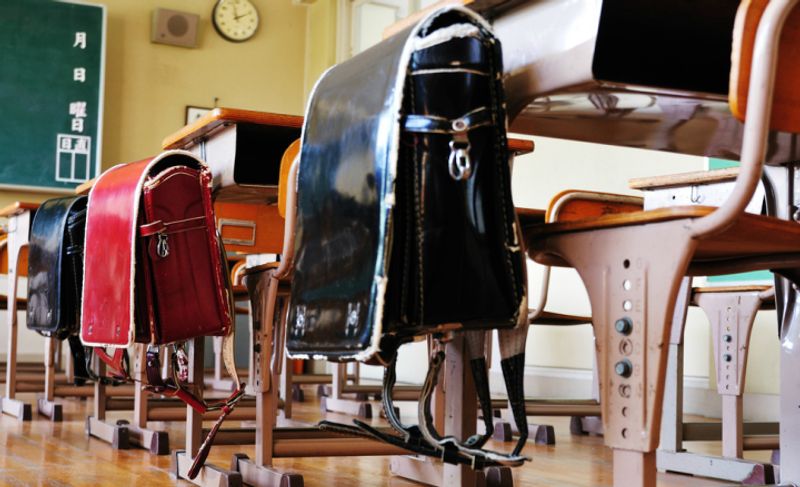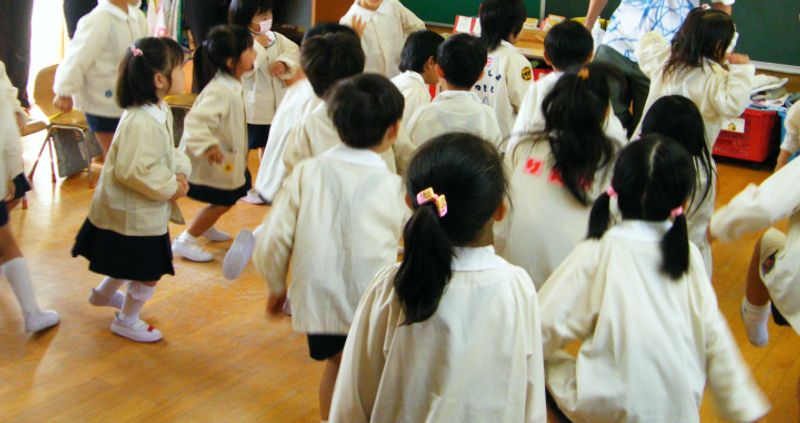Sep 2, 2016
How to get off to a good start as an English teacher in Japan
When considering the question of how to get off to a good start as an English teacher in Japan, I suppose we should quickly address some of the fundamentals of life in general in the Japanese workplace, much of which are shared around the world. In fact, if you play it by the book written about whichever country you’re from, this will likely suffice to keep you covered in Japan for a while.
There may be some potential stumbling blocks which we list here …
Punctuality: Being on time in Japan means being early. In regards to a school 10-15 mins should do it. So when you’re told that, say, school starts at 9:00 am, that means you should have done all your pre-work ablutions and be ready to start at 9:00 am.
Facial hair: Bit of a weird one this (and one that this writer has embarrassingly had little to worry about), so better to check with whoever before you rock up to a class. Sometimes it’s tolerated, sometimes not. At the very least though, it needs to look planned, or sculpted, somehow.
Smart dress: They’re snappy dressers, the Japanese. Even just for a cigarette run to the convenience store (either that, or they go polar opposite and turn up in threads that might as well be pyjamas). We’re not saying you have to be covered in the latest gear, but just be aware that appearance in the workplace carries (rightly or wrongly) more weight over here.
Don’t be weird: You hear all sorts of stories about nutters that have come to Japan to teach English. Maybe this is because the screening for some of these positions is cursory at best, and can allow any waif and stray into the classroom. Just don’t be one of them. Please!
Perhaps another factor to address to help get things off to a smooth start would be to avoid any teaching-English-in-Japan related forums. Particularly the ones that focus on complaints. These are the grotty realm of the dangerously unstable, the wind-up merchants, the psychotically bored, the self righteous, the people that we just have to tolerate rather than embrace.
In some cases, complaints are justified (although no one’s really listening); the company is shady, the company is great, the job is great, the job is rubbish, the job is just that, a job. You’ll find all this out in due course, and anyway, the largest factor in what kind of experience you have is you. So, start things off with a clean slate.
Down to the nitty gritty …
As we continue to pave the way for a smooth start to work as an English teacher in Japan, perhaps it would be pertinent to break things down into genre; for the first time teacher in Japan, there are perhaps three areas to consider … the ALT, eikaiwa/英会話 (conversation schools), and kids …

The eikaiwa …
The vibe of the eikaiwa differs considerably from a lot of other teaching jobs in Japan, particularly that of the ALT. This is a much more familiar environment as you’ll be sharing (often tight) space with people from similar work cultures, who are able (and often not afraid) to tell you exactly what they think, and where their head is at.
Ask which classroom you can use …
Don’t just roll up to whichever classroom has the best views (if any). Eikaiwa teachers can be a territorial bunch, and those that are already in residence may well have marked theirs. Ask before hand, and make sure you’re asking the teachers themselves rather than the Japanese staff, who (following the rule book) will likely tell you that any available room is fine. It’s not, even if technically it is. A lot of eikaiwa teachers won't care about that.
Be flexible on your days off …
Getting two consecutive days off in an eikaiwa is the stuff of dreams. Having them on a Saturday and Sunday is a bit like the Holy Grail; it doesn’t exist. Anyway, as a newbie, having management ask older teachers to change their days off because of you, is likely to go down about as well as muddy shoes in a Japanese house.
Don’t follow the textbook … or do!
The larger eikaiwa usually have some kind of ‘teaching system’ that they peddle as being the most effective. It’s all empty nonsense pushed off on the students as a sales point (They don’t really believe it, do they?). Anyway, the point is 90% of your students, once they’ve started their course, don’t care about it, the ‘teaching system’ that is. Eikaiwa is the truncated Japanese for English conversation. That’s what they’re here for, not grammar drills from a textbook. Of course, they’ve paid for the books (they have to), so give them a token look during the class, pick out the odd example or two, have a look at the glossy pictures, but in large part the students are here because they want to talk with you. Embrace this. In your first class, forget everything you were taught in training. Just be you; cool, funny, engaging, interested in whatever you’re interested in, and more importantly (of paramount importance, in fact) be interested in what they’re interested in. Ask em questions. Keep asking them questions. And, tread lightly. If they’re not very good at English, get the kid gloves on and be super nice.
On the other hand, if you’re as nervous as you were your first day at school as a kid (perfectly understandable), maybe it’s better to play it by the book, lest you find yourself adrift in an ocean of silence (in this kind of situation, 50 mins can feel like the Pacific).
Do lobby talk …
Oh, you’ll be loved for this. If you can work a lobby, making introductions, cracking (appropriate) jokes, calming the nerves of shy students, talking to confident students like they’re an old friend, YOU, English teacher in Japan, will be having students request your classes in no time! So, in which case, maybe it’s not a good idea after all! Either way, it’ll help you get comfortable in your job at greater speed.

The ALT
In contrast to the eikaiwa gig, for the ALT, classes and classroom environment are often much more schedule-driven (there are tests to be prepared for), and office life can feel somewhat isolated in the sense that there are fewer chances to interact with others that have come over to Japan to teach. For resources and support with making the most out of your Japan ALT experience, head over to ALTInsider.
Bring gifts ….
The Japanese culture of gift-giving is somewhat diluted in the eikaiwa, where fellow English teachers might not be expecting you to bring anything. In the staff room of a regular school though, it’s considered the norm. In fact, it’s not even considered. It just happens by default. Bringing a few snacks from back home to put in the staff kitchen will go down well.
Look like you’re happy to be there …
Yes, teaching is a vital and honourable profession. However, this doesn’t stop some teachers back home from going into the field simply because if offers great holidays. Not so in Japan, where staff get holidays akin to an overworked ER doctor. Coming into this profession without really wanting to be at the school would be a daunting task. As such, as an ALT you’ll likely be surrounded by people who really love what they do, or at least, love working with youngsters. You never hear them complain about work, or openly wish that it was Friday (they’ll probably be in school on Saturday anyway). So, it behoves you, the ALT, to join in, and look like you want to be there. Look like you really love those students who just slept through your first class.
Be prepared to teach … like your very first class.
Training from whatever organization put you in the gig may or may not do this. Mentally though, be ready. Yes, you’re supposed to be there to assist. Depending on the teacher you’re partnered with though, you could be thrown in at the deep end. In light of this, don’t prepare a lesson that relies too much on student participation. That sounds odd, we know. What we’re trying to say is be prepared for students to stare blankly, or bury their head in their desks if you ask them to say something.
Don’t go in heavy handed …
Staying with those first few classes, go light on the discipline thing. Technically, it’s not your job anyway. As you get more experience though, you may (or may not) be given the green light on this sort of thing from the school. Going in all guns blazing when you’ve just arrived is a bad idea. It could take ages for you to get the students back on side.
Tell everyone you’ve arrived, and that you’re leaving …
We mean on your first day, and every day after that, up to and including your last. Everyone does it in whatever line of work in Japan (except perhaps special ops jietai). You might be shy to do it on your first day but it’ll stamp your presence in the staff room, and if you don’t do it right away it’ll seem awkward when you eventually start. And you will.
Don’t forget your indoor shoes …
You’ll be told about this in training, and it’s perhaps one of the few cold, hard facts that you’ll hear during that time - at public schools you have indoor shoes, and outdoor shoes (and gyms shoes). You don’t want to be the only one in the school slippers. That’ll definitely mark you out as a newbie. Don’t go for anything fancy for your indoor shoes, either. A rubbish pair of sneakers will do it (the earlier statement about Japanese being snappy dressers emphatically doesn’t apply to the nation’s teaching staff who’ll think nothing of airing out a 1990s shell suit).

The Teacher of Kids
The teaching kids gig can cross pollinate between the ALT gig (early grades in elementary school) and the eikaiwa gig. In fact, kids are really where the market is at, with so many schools trying to get a piece of it. Of course, it may be that you’re working for a school that teaches kids, exclusively. The points below will apply more to the latter, and those eikawa that have kids classes.
Get the moms on side …
Some moms are pretty relaxed about what’s going on with their child’s English lessons. Others really want to be involved. Either way, they’ll all want to have a look at you, and they’ll all appreciate the gesture (even if it’s just token) of you telling them what you did in class. Get into this habit early doors, otherwise it’ll look really weird if you start doing it further down the line. Doing it though, just makes the job much smoother, and you might find that some moms can help you out if a student is struggling to improve, or isn’t paying attention in class. Even if you’re not in this to help the students learn (shock, horror, yes those people exist) it’ll just make for a more pleasant vibe at work.
Be funny, but just a little bit scary too …
This writer’s experience of teaching the little ones was akin to Europe in the 1930s; on the verge of all out chaos. I was always barely able to maintain order. This is because I went in playing the clown and didn’t establish any rules. When I eventually tried to do the latter, the students could see right through me and weren’t having any of it. After that, there was only one party in charge of class, and it wasn’t the teacher. Yes, the kids need to laugh, have fun, and be comfortable with you. They also need to know though, that you’re the boss. It’s a difficult balancing act, and there will likely be tears. Just make sure they’re not yours.
Accept that you’re not their favorite initially, but that you soon can be. Like, after about 5 mins of you first class …
This writer had on the job training when it came to teaching kids in Japan. We’d spend a week following around the very teacher that we were replacing, even in their final class when they had to say a ‘Goodbye’ forever to kids who were in tears. And then go outside and receive glowing praise and bunches of flowers from grateful moms. All the while you’re skulking in the background feeling like you’ve just murdered Father Christmas. It’s an awkward experience to say the least. Chin up though, get a good first lesson under your belt the kids will barely even remember that last teacher’s name (they’ve seen plenty come and go remember).
Calling on all English teachers in Japan. Do you have any tips on how to get off to a good start for new teachers in Japan? Drop your ideas below.
See us on …
Twitter: @City_Cost_Japan
Facebook: @citycostjapan
Images (cropped)
Eikawa: Michael Flickr License
Kids: Emran Kassim Flickr License



3 Comments
Higgins
on Dec 14
Could don't be weird be moved up to like the number one spot?
City-Cost
on Dec 14
@Higgins Ha! Ha! That's where I wanted to put it, believe me! Guess I chickened out!
Higgins
on Dec 14
@City-Cost haha next time!